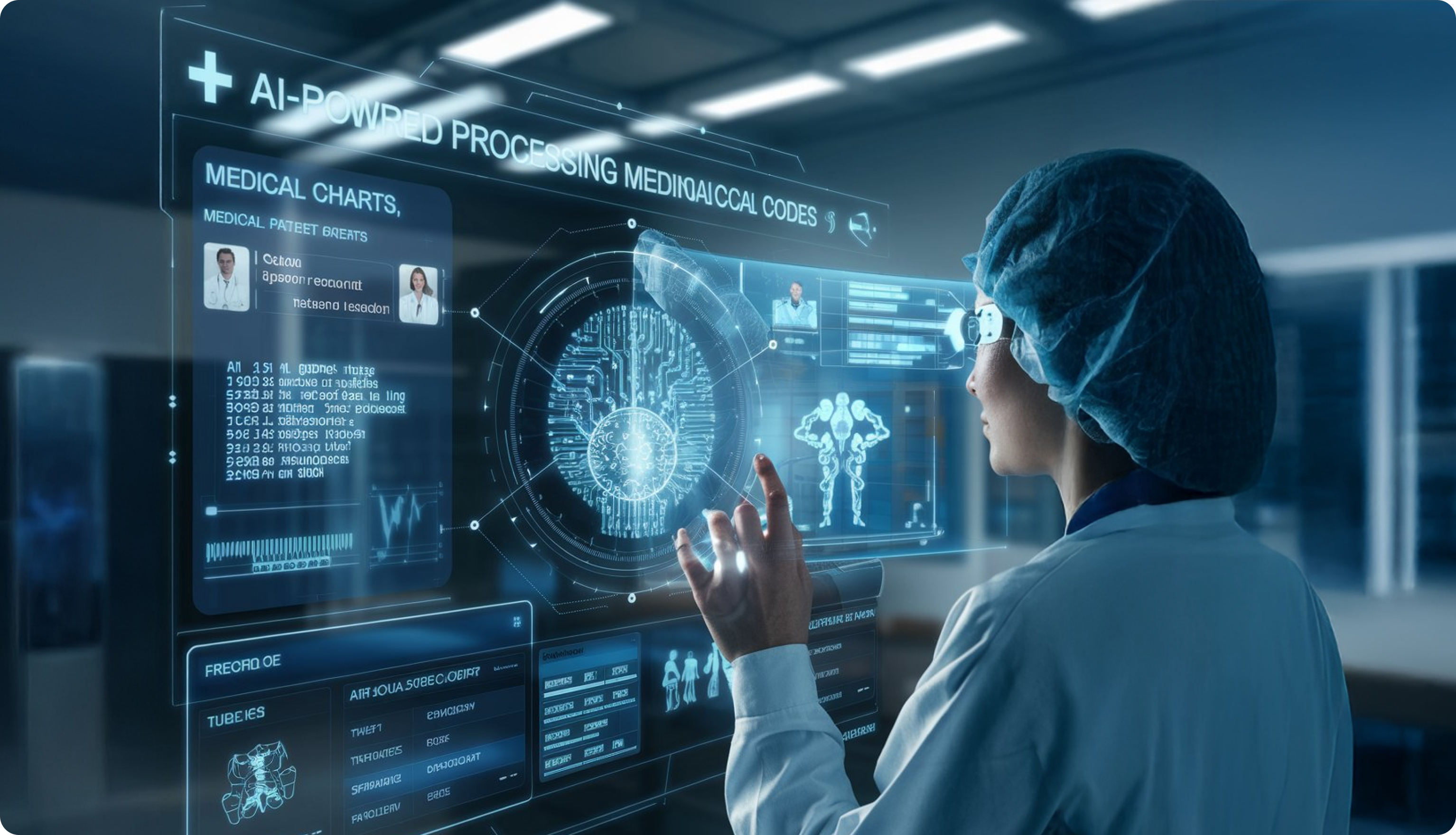The Role of AI in Medical Coding: Revolutionizing Healthcare Administration

In the healthcare industry, administrative tasks often take up a significant amount of time and resources. One area that has long been a challenge for healthcare providers is medical coding. Medical coding is a critical process that translates a patient’s medical diagnosis, treatments, and procedures into standardized codes for billing, insurance claims, and patient records. These codes are essential for ensuring accurate reimbursements, compliance with regulations, and efficient communication between healthcare providers and insurance companies. However, the process is often complex, time-consuming, and prone to human error.
The introduction of AI-driven solutions is now transforming this landscape. AI can automate medical coding, reducing errors, speeding up processes, and ultimately allowing healthcare professionals to focus more on patient care. In this blog, we will explore how AI-driven solutions are improving the medical coding process, the challenges involved, and how healthcare providers can benefit from this technology.
The Challenges of Traditional Medical Coding
Medical coding involves translating a vast array of medical conditions, treatments, procedures, and diagnoses into alphanumeric codes. This process can be overwhelming, especially considering the volume of data and the constant changes in medical codes, standards, and insurance requirements.
Traditionally, medical coding has been performed manually by coding specialists. They examine patient records and documents, such as physician notes, lab results, and discharge summaries, to determine the appropriate codes. While skilled, human coders are susceptible to errors. The complexity of medical terminology, the sheer volume of records, and the potential for misinterpretation can lead to costly mistakes, delayed payments, and even compliance issues.
Furthermore, the coding process is often slow and labor-intensive, which can create bottlenecks in the healthcare administration workflow. With the growing demands on healthcare providers, many organizations are seeking solutions that not only improve accuracy but also speed up the process and reduce administrative burdens.
How AI Can Improve Medical Coding
AI-driven solutions are revolutionizing medical coding by automating the process and improving both efficiency and accuracy. Here's how:
Automation of Routine Coding Tasks
AI can take over the routine and repetitive aspects of medical coding, significantly speeding up the process. Machine learning algorithms can analyze medical records and automatically assign the correct codes based on the information provided. This reduces the need for manual intervention and allows coders to focus on more complex cases that require human expertise.
By automating the coding of common diagnoses, procedures, and treatments, AI systems can help healthcare organizations process a higher volume of records in less time. This is particularly important for busy hospitals, clinics, and insurance companies, where a fast turnaround is crucial for maintaining cash flow and ensuring timely reimbursements.
Error Reduction
One of the most significant challenges in medical coding is ensuring accuracy. Incorrect coding can lead to claim denials, delayed payments, or even legal and regulatory issues. Human coders, no matter how experienced, can make mistakes due to fatigue, oversight, or the complexity of medical records.
AI-driven medical coding solutions can greatly reduce these errors by relying on vast datasets, pattern recognition, and machine learning models. These systems are capable of processing large volumes of data, cross-referencing information, and ensuring that codes are assigned based on the most up-to-date medical knowledge and coding guidelines. With AI, healthcare providers can minimize coding errors and avoid costly mistakes that can affect reimbursements and compliance.
Faster Turnaround Times
AI can dramatically speed up the medical coding process. Automated systems can quickly analyze patient records and generate codes without waiting for human intervention. This results in faster processing times and allows healthcare organizations to submit claims and process reimbursements more efficiently.
For hospitals and other healthcare facilities with large volumes of patient data, speeding up the coding process can have a significant impact on operational efficiency. Faster coding also helps healthcare organizations maintain a smooth and timely flow of claims and payments, which is essential for their financial health.
Consistency and Standardization
One of the key benefits of AI-driven medical coding is the ability to standardize the coding process. Unlike human coders, who may interpret medical records differently, AI systems rely on predefined algorithms that consistently apply the same coding standards. This ensures that the same types of diagnoses, procedures, and treatments are consistently assigned the correct codes, improving the overall reliability of the coding process.
Consistency in coding is especially important for compliance with regulations such as the Health Insurance Portability and Accountability Act (HIPAA) and the Affordable Care Act (ACA). AI-driven medical coding tools can help ensure that all codes are assigned in compliance with these regulations, reducing the risk of audits or fines.
Adaptability to New Codes and Changes
The world of medical coding is constantly evolving. New procedures, treatments, and diagnoses are regularly introduced, and existing codes are updated to reflect the latest medical advancements. Keeping up with these changes can be difficult for human coders, especially with the sheer volume of new information and the frequent updates to coding systems.
AI systems can be trained to adapt to new coding standards and changes in real-time. When new codes are introduced or existing codes are modified, AI can automatically update its coding database to reflect these changes. This ensures that healthcare providers are always using the most accurate and up-to-date codes, without the need for constant retraining of human coders.
Benefits of AI-Driven Medical Coding for Healthcare Providers
The implementation of AI in medical coding offers several key benefits for healthcare providers:
Cost Savings
Automating medical coding reduces the need for large teams of manual coders, which can lead to significant cost savings for healthcare organizations. With AI handling much of the repetitive work, businesses can reallocate resources and reduce the overhead costs associated with manual coding tasks.
Improved Revenue Cycle Management
AI-driven coding systems can reduce the number of coding errors, claim denials, and delayed payments. With faster, more accurate coding, healthcare organizations can streamline their revenue cycle management processes, leading to improved cash flow and better financial stability.
Compliance and Risk Mitigation
Ensuring compliance with ever-changing regulations is a constant challenge in healthcare. AI can help organizations stay up to date with the latest coding standards and regulatory requirements, reducing the risk of errors that could lead to legal issues or penalties. By automating the coding process, healthcare providers can reduce the likelihood of audits and non-compliance.
Improved Patient Care
While AI is focused on the administrative side, its benefits can extend to patient care as well. By streamlining the coding process, healthcare providers can spend less time on paperwork and more time focusing on patient care. With accurate coding, patients' treatment records are more likely to be properly documented, which can improve the quality of care and facilitate communication among healthcare professionals.
Talos: Enhancing Medical Coding Efficiency
As the healthcare industry increasingly turns to AI for assistance in medical coding, Talos is at the forefront of providing reliable and efficient solutions. Talos uses advanced machine learning and AI algorithms to automate medical coding, offering an intuitive platform that reduces the burden on human coders while improving accuracy.
With Talos, healthcare organizations can benefit from a streamlined coding process that ensures error-free coding, reduces manual labor, and keeps up with the ever-changing landscape of medical standards. The platform is designed to be flexible, adapting to new codes and standards as they emerge, and ensuring compliance with regulations.
By incorporating Talos into their workflow, healthcare providers can boost operational efficiency, reduce costs, and improve their revenue cycle management. Talos allows healthcare professionals to focus on what truly matters – providing the best care for their patients.
Conclusion: The Future of Medical Coding with AI
AI is transforming the medical coding process by offering a more efficient, accurate, and reliable solution. From automating routine tasks to reducing errors and enhancing compliance, AI is changing the way healthcare organizations handle medical coding, and the results are clear: improved efficiency, reduced costs, and better patient care.
As AI continues to evolve, it will only become more integral to healthcare administration. By adopting AI-driven medical coding solutions like Talos, healthcare providers can stay ahead of the curve, ensuring they can navigate the complexities of medical coding while focusing on delivering exceptional patient care. The future of medical coding is here, and it’s powered by AI.




